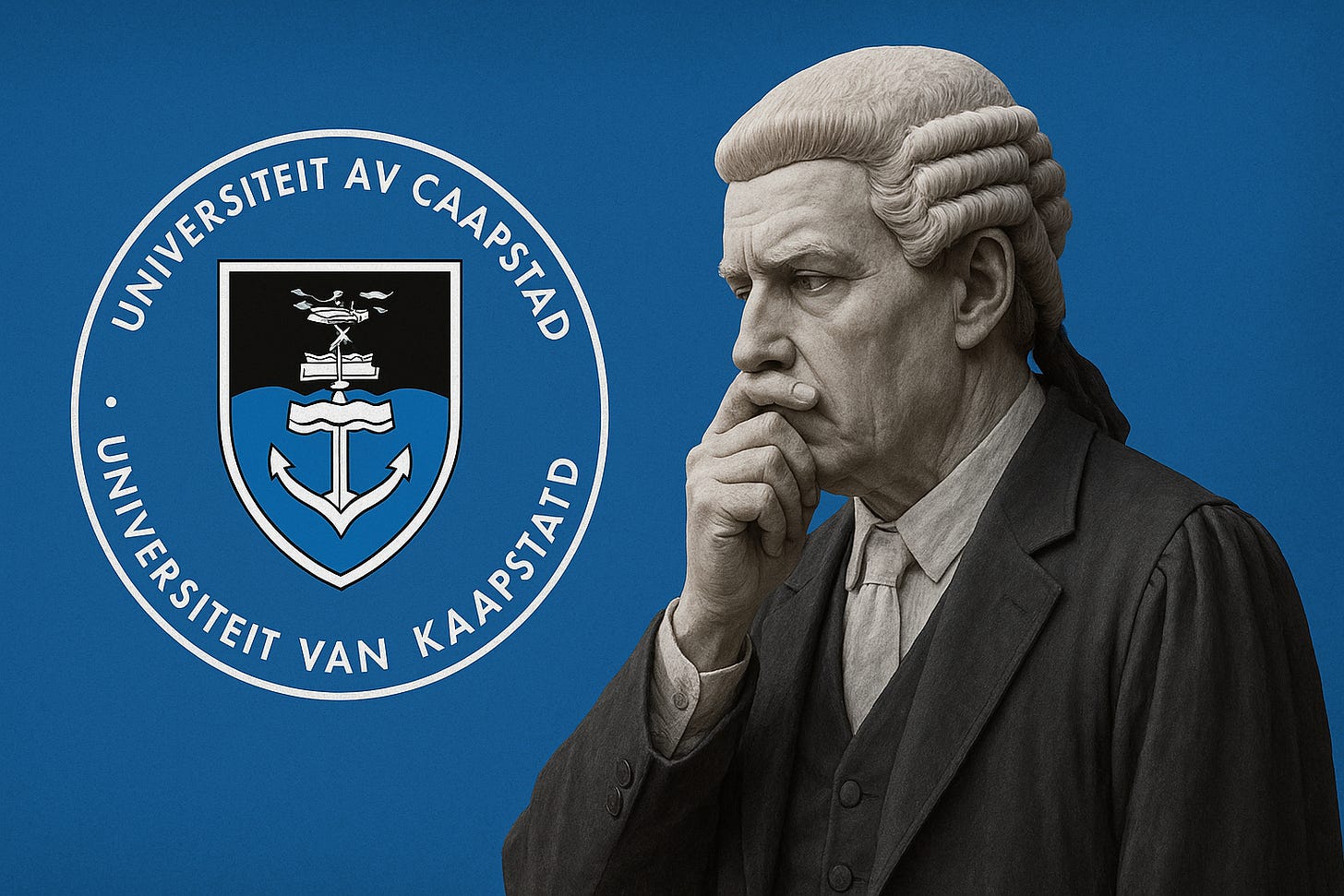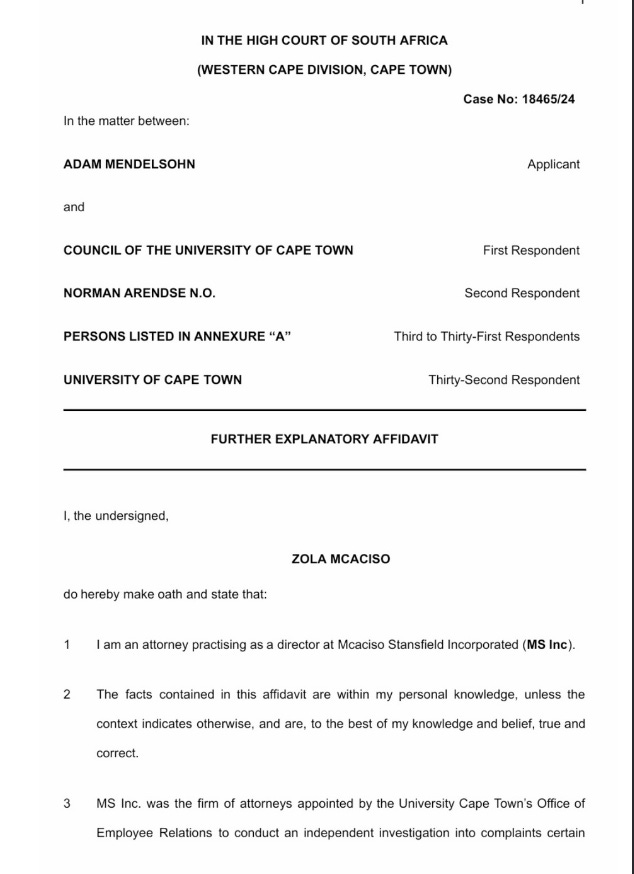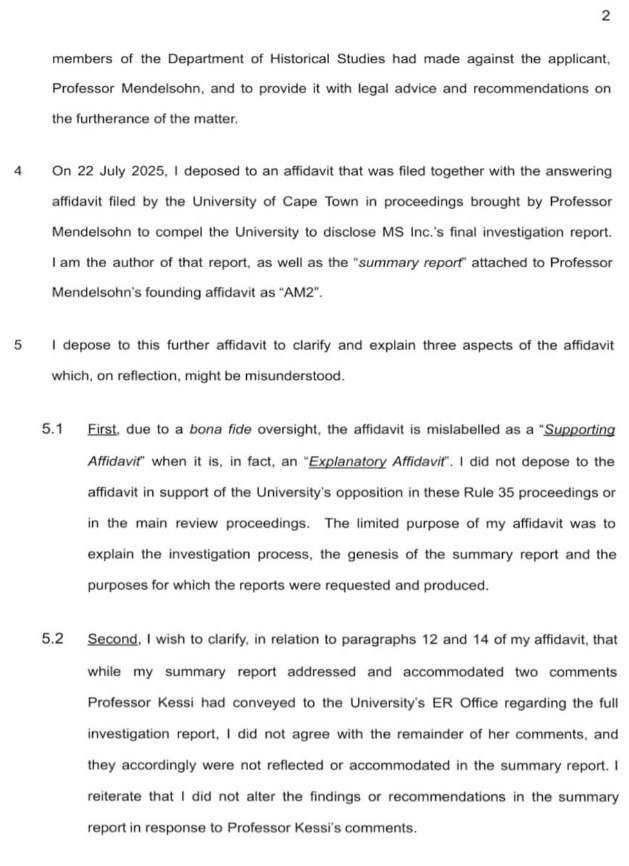UCT Lawyers Alleged of Attempt to Withhold Key Evidence in High Court Battle
The rule of law only functions when all actors play by the rules.
Written by: Jade Petersen
Contentious cases can bring out the worst in people. The rule of law only functions when all actors play by the rules. That certainly seems not to be the case in the ongoing proceedings between Professor Adam Mendelsohn and the University of Cape Town (UCT).
The seemingly sedate tone of the latest affidavits exchanged between the parties obscures the extraordinary facts they contain. The case, which revolves around the legality of two resolutions passed by UCT’s Council in June 2024, had already grown heated. The Chair of UCT’s Council has been accused of perjury, and members of council of bullying and intimidation. But now UCT’s legal representatives have themselves been accused of attempting to mislead the court. Astonishingly, the key evidence for this claim comes from a lawyer who previously signed an affidavit supportive of UCT’s case.
The latest explosive turn relates to Mendelsohn’s suspension as the head of the history department in November 2024. He has argued that his suspension was in retaliation for bringing litigation against the University. UCT Council Chair, Advocate Norman Arendse SC, insists that there is “no truth whatsoever” in these claims. Arendse relies heavily on the affidavit of Professor Shose Kessi, Dean of Humanities, who stated in an affidavit deposed on 2 May 2025 that an investigation into Mendelsohn was still ongoing.
A Clash of Affidavits
Mendelsohn responded sharply, accusing Kessi of submitting false testimony and knowingly making untrue allegations. Forced to answer, the Dean submitted a second affidavit rejecting “in the strongest terms” what she called an “unfounded allegation” of perjury.
Central to the dispute is the report of an independent investigation by attorney Zola Mcaciso of MS Inc. The report was commissioned by UCT to investigate the allegations against Mendelsohn that led to his suspension as Head of the History Department. It exonerates Mendelsohn and points to political and ideological factors precipitating his suspension. Mendelsohn has asked UCT for the full report to be made available to the Court. UCT has refused. Mendelsohn has still not seen the full report and has brought an interlocutory application to compel UCT to make it available. UCT maintains that it is privileged and irrelevant to the Review Application.
A major point of contention turns on whether or not Dean Kessi had sight of the investigation report in March 2025 or at any point before swearing her affidavit on 2 May? The answer to this impacts her claim that the investigation was still in progress in early May. Arendse accuses Mendelsohn of quibbling about the semantics of whether or not the investigation was ongoing, though it is hard to see how perjury can be considered a matter of semantics.
A further twist
As if the accusation of perjury is not enough, the Dean is now accused of attempting to influence Mcaciso to amend parts of his investigative report, echoing a controversy that exercised Judge Kriegler in the Wilgenhof saga. Both Kessi and Arendse deny any improper influence. In a dramatic turn, evidence for this comes from Mcaciso, who has now recanted key details of his initial affidavit. His initial affidavit, prepared for him by UCT’s lawyers in July 2025, acknowledged some interventions from Kessi but stated that Mcaciso did not view these interventions as being out of the ordinary.
The second affidavit, which contradicts key aspects of the first, was prepared after Mcaciso received independent legal advice from lawyers outside of UCT. This affidavit expressly recognises that the earlier affidavit did not disclose all of Kessi’s interventions and that Mcaciso resisted an intervention by Kessi that he regarded as inappropriate. Mcaciso does not state what that intervention was because of the legal privilege claimed by UCT.
It is clear from Mcaciso’s second affidavit that the first affidavit prepared by UCT’s lawyers did not make full disclosure of Kessi’s interventions, and only revealed those interventions that the lawyers regarded as being benign. Mcaciso also makes it clear that he does not support the affidavits filed by Arendse and Kessi.
Attempt to Influence Evidence
Despite Mcaciso deposing to this second affidavit on 31 July 2025, it was only filed with the court on 5 August 2025 by UCT’s lawyers. It has been uncovered that during this interval, the lawyers allegedly attempted to persuade Mcaciso to replace his sworn statement with a watered-down version—an effort rebuffed by Mcaciso’s legal team. The alleged intervention by UCT’s lawyers not only insinuates an attempt to conceal the evidence of Mcaciso’s second affidavit, but also to manipulate, and interfere with, existing evidence.
According to multiple sources at UCT, UCT’s lawyers have allegedly also attempted to pressure others to recant key details in unflattering affidavits that they provided to UCT by filing affidavits that were integritous to their own recollection of events. This is believed to includes the Executive Director of the Development and Alumni Department.
This latest saga underscores troubling themes relating both to UCT’s conduct and repeated allegations about UCT’s lack of honesty with the Court in presenting its defence.
The high-stakes review application—now clouded by accusations of perjury, evidence concealment, and improper interference —will be heard in the Cape High Court in October 2025.
Jade Petersen is a concerned South African citizen.






